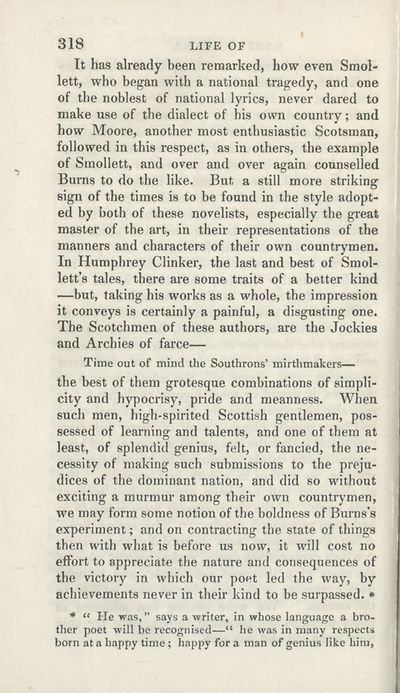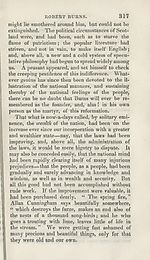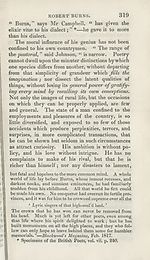Scotland/Scots > Life of Robert Burns
(328)
Download files
Complete book:
Individual page:
Thumbnail gallery: Grid view | List view

318 LIFE OF
It has already been remarked, how even Smol¬
lett, who began with a national tragedy, and one
of the noblest of national lyrics, never dared to
make use of the dialect of his own country; and
how Moore, another most enthusiastic Scotsman,
followed in this respect, as in others, the example
of Smollett, and over and over again counselled
Burns to do the like. But a still more striking
sign of the times is to be found in the style adopt¬
ed by both of these novelists, especially the great
master of the art, in their representations of the
manners and characters of their own countrymen.
In Humphrey Clinker, the last and best of Smol¬
lett’s tales, there are some traits of a better kind
—but, taking his works as a whole, the impression
it conveys is certainly a painful, a disgusting one.
The Scotchmen of these authors, are the Jockies
and Archies of farce—
Time out of mind the Southrons’ mirthmakers—
the best of them grotesque combinations of simpli¬
city and hypocrisy, pride and meanness. When
such men, high-spirited Scottish gentlemen, pos¬
sessed of learning and talents, and one of them at
least, of splendid genius, felt, or fancied, the ne¬
cessity of making such submissions to the preju¬
dices of the dominant nation, and did so without
exciting a murmur among their own countrymen,
we may form some notion of the boldness of Burns’s
experiment; and on contracting the state of things
then with what is before us now, it will cost no
effort to appreciate the nature and consequences of
the victory in which our poet led the way, by
achievements never in their kind to be surpassed. •
* “ He was, ” says a writer, in whose language a bro¬
ther poet wall be recognised—“ he was in many respects
born at a happy time ; happy for a man of genius like him,
It has already been remarked, how even Smol¬
lett, who began with a national tragedy, and one
of the noblest of national lyrics, never dared to
make use of the dialect of his own country; and
how Moore, another most enthusiastic Scotsman,
followed in this respect, as in others, the example
of Smollett, and over and over again counselled
Burns to do the like. But a still more striking
sign of the times is to be found in the style adopt¬
ed by both of these novelists, especially the great
master of the art, in their representations of the
manners and characters of their own countrymen.
In Humphrey Clinker, the last and best of Smol¬
lett’s tales, there are some traits of a better kind
—but, taking his works as a whole, the impression
it conveys is certainly a painful, a disgusting one.
The Scotchmen of these authors, are the Jockies
and Archies of farce—
Time out of mind the Southrons’ mirthmakers—
the best of them grotesque combinations of simpli¬
city and hypocrisy, pride and meanness. When
such men, high-spirited Scottish gentlemen, pos¬
sessed of learning and talents, and one of them at
least, of splendid genius, felt, or fancied, the ne¬
cessity of making such submissions to the preju¬
dices of the dominant nation, and did so without
exciting a murmur among their own countrymen,
we may form some notion of the boldness of Burns’s
experiment; and on contracting the state of things
then with what is before us now, it will cost no
effort to appreciate the nature and consequences of
the victory in which our poet led the way, by
achievements never in their kind to be surpassed. •
* “ He was, ” says a writer, in whose language a bro¬
ther poet wall be recognised—“ he was in many respects
born at a happy time ; happy for a man of genius like him,
Set display mode to:
![]() Universal Viewer |
Universal Viewer | ![]() Mirador |
Large image | Transcription
Mirador |
Large image | Transcription
| Antiquarian books of Scotland > Scotland/Scots > Life of Robert Burns > (328) |
|---|
| Permanent URL | https://digital.nls.uk/108249795 |
|---|
| Description | Thousands of printed books from the Antiquarian Books of Scotland collection which dates from 1641 to the 1980s. The collection consists of 14,800 books which were published in Scotland or have a Scottish connection, e.g. through the author, printer or owner. Subjects covered include sport, education, diseases, adventure, occupations, Jacobites, politics and religion. Among the 29 languages represented are English, Gaelic, Italian, French, Russian and Swedish. |
|---|

